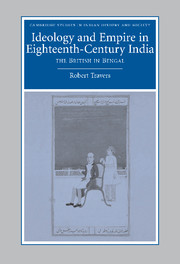Book contents
- Frontmatter
- Contents
- Preface and acknowledgements
- Abbreviations and note on currency
- Glossary of Indian terms
- Map of Bengal and Bihar in the Eighteenth-Century
- Introduction
- 1 Imperium in imperio: the East India Company, the British empire and the revolutions in Bengal, 1757–1772
- 2 Colonial encounters and the crisis in Bengal, 1765–1772
- 3 Warren Hastings and ‘the legal forms of Mogul government’, 1772–1774
- 4 Philip Francis and the ‘country government’
- 5 Sovereignty, custom and natural law: the Calcutta Supreme Court, 1774–1781
- 6 Reconstituting empire, c. 1780–1793
- 7 Epilogue
- Bibliography
- Index
- Cambridge Studies in Indian History and Society
Introduction
Published online by Cambridge University Press: 18 July 2009
- Frontmatter
- Contents
- Preface and acknowledgements
- Abbreviations and note on currency
- Glossary of Indian terms
- Map of Bengal and Bihar in the Eighteenth-Century
- Introduction
- 1 Imperium in imperio: the East India Company, the British empire and the revolutions in Bengal, 1757–1772
- 2 Colonial encounters and the crisis in Bengal, 1765–1772
- 3 Warren Hastings and ‘the legal forms of Mogul government’, 1772–1774
- 4 Philip Francis and the ‘country government’
- 5 Sovereignty, custom and natural law: the Calcutta Supreme Court, 1774–1781
- 6 Reconstituting empire, c. 1780–1793
- 7 Epilogue
- Bibliography
- Index
- Cambridge Studies in Indian History and Society
Summary
It is impossible, Mr Speaker, not to pause here for a moment, to reflect on the inconstancy of human greatness, and the stupendous revolutions that have happened in our age of wonders. Could it be believed when I entered into existence, or when you, a younger man, were born, that on this day, in this house, we should be employed in discussing the conduct of those British subjects who had disposed of the power and person of the Grand Mogul? This is no idle speculation. Awful lessons are taught by it, and by other events, of which it is not too late to profit.
Edmund Burke, Speech on Fox's India Bill, 1783.Edmund Burke's pregnant pause invited the commons of Great Britain to gaze on the lonely, impoverished emperor of Hindustan, and to beware the fate of empires. Seven years after the publication of the first volume of Edward Gibbon's Decline and Fall of the Roman Empire, imperial history appeared to Burke as the record of ‘awful lessons’. Britain's own imperial destiny hung in the balance. Her colonies in North America, after a long and bitter struggle, were breaking off to build a new model of republican liberty, much heralded by radicals in Britain itself. Meanwhile, a British trading company, the United Company of Merchants of England Trading to the East Indies (or East India Company for short), had conquered a ‘vast mass’ of territories, ‘larger than any European dominion, Russia and Turkey excepted’, ‘composed of so many orders and classes of men … infinitely diversified by manners, by religion, by hereditary employments, through all their possible combinations’.
- Type
- Chapter
- Information
- Ideology and Empire in Eighteenth-Century IndiaThe British in Bengal, pp. 1 - 30Publisher: Cambridge University PressPrint publication year: 2007



